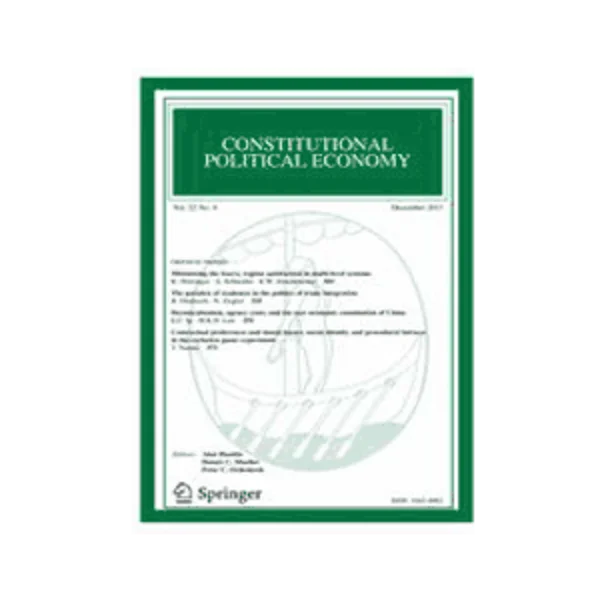-
do departures from democratic accountability compromise the stability of public finances? keynesianism, central banking, and minority governments in the canadian system of party government, 1867–2009
جزئیات بیشتر مقاله- تاریخ ارائه: 1392/07/24
- تاریخ انتشار در تی پی بین: 1392/07/24
- تعداد بازدید: 1073
- تعداد پرسش و پاسخ ها: 0
- شماره تماس دبیرخانه رویداد: -
this paper is concerned with the effectiveness of westminster parliamentary institutions in ensuring the stability of a nation’s public finances. our starting point and major hypothesis is that the governance structure embodied in canada’s parliamentary system has contributed importantly to the maintenance of fiscal stability. the fact that the government of canada, like the central government of many other modern democracies, has survived for over a century without default on its public debt means that in some meaningful sense, long run responsibility with respect to the nation’s finances has in fact been achieved, and we show that this is in fact the case. hence a more meaningful test of our main hypothesis requires the designation of specific sub-periods when the ideological background for political policy making changed and/or when the institutions and organizations for operationalizing policy varied in ways that either improved or discouraged responsible fiscal performance. we consider ideational and institutional factors that are predicted to either enhance or detract from accountability and fiscal stability, including central banking, the adoption of keynesianism, inflation targeting and periods of minority government, and test for their effects on long run stability of the debt to gdp ratio using data for almost the entire history of the modern state from 1867 to 2008.
مقالات جدیدترین رویدادها
-
استفاده از تحلیل اهمیت-عملکرد در ارائه الگوی مدیریت خلاقیت سازمانی و ارائه راهکار جهت بهبود
-
بررسی تاثیر ارزش وجوه نقد مازاد بر ساختار سرمایه شرکت های پذیرفته شده در بورس اوراق بهادار تهران
-
بررسی تأثیر سطح افشای ریسک بر قرارداد بدهی شرکت های پذیرفته شده در بورس اوراق بهادار تهران
-
بررسی تأثیر رتبه بندی اعتباری مبتنی بر مدل امتیاز بازار نوظهور بر نقد شوندگی سهام با تأکید بر خصوصی سازی شرکت ها
-
تأثیر آمیخته بازاریابی پوشاک ایرانی بر تصویر ذهنی مشتری پوشاک ایرانی (هاکوپیان)
-
نشانگان قلبی-صورتی-پوستی: گزارش مورد و مرور مقالات
-
تاثیر میانقاب های مصالح بنایی بر رفتار لرزه ای قاب های فولادی دارای اتصال خورجینی و اجزای آن
-
بررسی اثر گسترش جانبی ناشی از روانگرایی بر شریان های حیاتی
-
بررسی استرس گرمایی محیط در کارگران نانوایی های کاشان
-
بررسی میزان گیرنده های igf-i و انسولین در سلول های گرانولوزا و تکا به روش ایمونوهیستوشیمی
مقالات جدیدترین ژورنال ها
-
مدیریت و بررسی افسردگی دانش آموزان دختر مقطع متوسطه دوم در دروان کرونا در شهرستان دزفول
-
مدیریت و بررسی خرد سیاسی در اندیشه ی فردوسی در ادب ایران
-
واکاوی و مدیریت توصیفی قلمدان(جاکلیدی)ضریح در موزه آستان قدس رضوی
-
بررسی تاثیر خلاقیت، دانش و انگیزه کارکنان بر پیشنهادات نوآورانه کارکنان ( مورد مطالعه: هتل های 3 و 4 ستاره استان کرمان)
-
بررسی تاثیر کیفیت سیستم های اطلاعاتی بر تصمیم گیری موفق در شرکتهای تولیدی استان اصفهان (مورد مطالعه: مدیران شرکتهای تولیدی استان اصفهان)
-
تفکیک سازی روان درمانی های مبتنی بر نمایش : تئاتر درمانگری ، روان نمایشی و نمایش درمانگری
-
بررسی تاثیر رهبری دانش محور بر نوآوری باز از طریق نقش میانجی ظرفیت جذب
-
exploration of waste plastic bottles use in construction
-
risk management of projects investment analysis
-
a novel type of alkaline activator for geopolymer concrete based on class c fly ash




سوال خود را در مورد این مقاله مطرح نمایید :